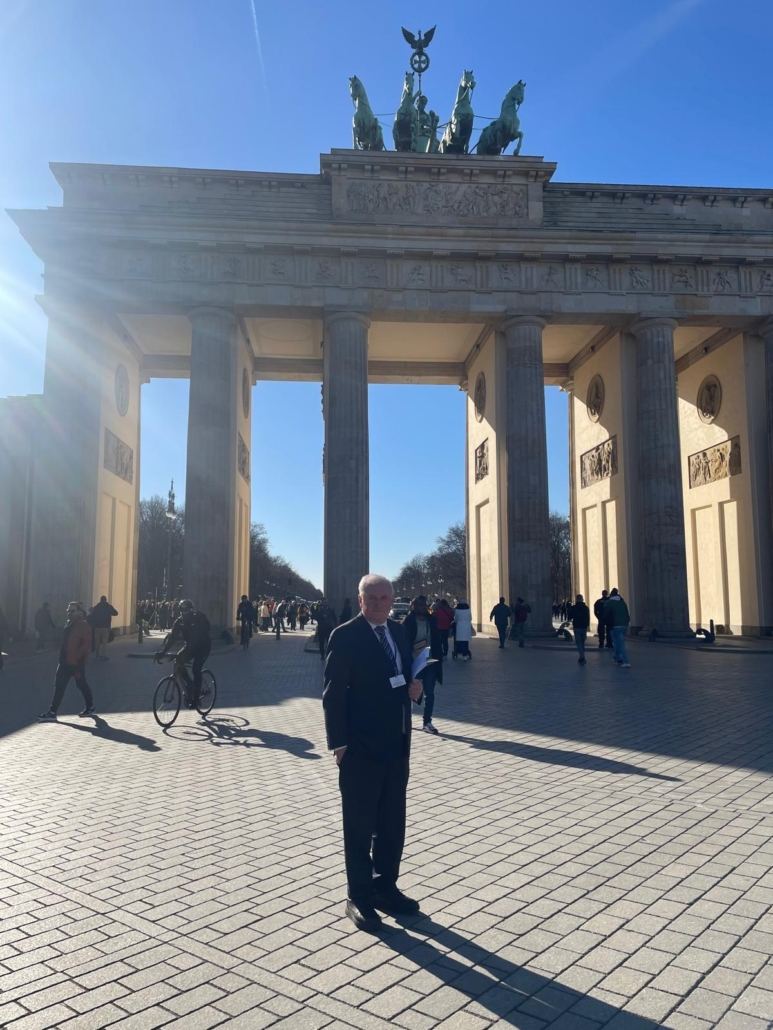Speech on Democracy at the World Forum in Berlin
March 18th-19th 2025
Ladies and gentlemen, it’s a great honour to be here with you in Berlin and at the World Forum, among many other distinguished speakers. As we gather, the world is faced with ever more significant challenges in terms of conflict, climate change, energy security and food security for the most vulnerable across the planet. In an increasing number of cases, societies are faced with the problem of making democratic participation more relevant to a new generation who appear to be increasingly disenchanted with long-established methods of governance that seem to offer long terms solutions to what many see as immediate problems that short term interventions will not solve.
The world of political leadership is a vastly different landscape than when I entered politics in my early twenties. My appointment as a government minister in Ireland in the 1980s coincided with the advent of 24-hour news and the need to fill dedicated channels with a constant flow of news and information that was brought to people’s attention almost immediately or if at least you were beside a television screen. Today, in the age of the smartphone, a news story is available in the hand of a person with a smartphone and where political reaction is a requirement in that instant.
As I said at the outset, democracy is both a deliberative and participative exercise for societies. It is deliberative in that public debate can create the opportunity to consider courses of action on economic and social challenges in the medium to long term and participative in that it encourages people to come forward to contribute solutions to policy challenges in a spirit of public service. One of the impacts of media and, in particular, social media over the past decade and a half has been the development of myths that if problems can be expressed simply and succinctly in a short few sentences, then there must be equally simple and ready solutions to these problems. The other impact of all of this noise against which political decisions must be taken has limited the space where we can attract different views and individuals who can balance political debate and give a sense that democratic participation is a worthwhile pursuit towards the making of better societies. In short, many capable and accomplished people would probably think twice before offering themselves as candidates for public office, and that is a serious negative in the development and maintenance of any democratic society.
Ireland established its democracy a little over one hundred years ago, and today, it is the fifteenth-longest continuous and unbroken democracy in the world. We, like many societies, are not immune or insulated from the impact of influences across the globe, and we also have the challenge of managing expectations around the provision of public services commensurate with the resources created by the economy. However, the simple act of choosing our governments with pieces of paper and pencils is a simple and powerful display of people freely choosing their leaders in the arena where ideas are what matter. Our accession and early involvement in the institutions of the European Union also had a powerful and transformative impact on our sense of the importance of democratic participation within Europe; through the European Council of Ministers and the Parliament, we have had the opportunity to be central to the development of the EU institutions as well as the democratic values that exist at its heart.
Today, the challenge for political leaders is to find ways to talk to our people and societies, not simply in terms of the problems and challenges we face but rather in a spirit of framing the solutions to these challenges, which will, for the most part, continue to grow. When I entered the Irish Parliament in 1977, the population of the Planet was 4.2 billion. Today, it stands at just over 8 billion. The challenges of climate, resources, food security and migration in a globalised world require new and more sophisticated approaches across democratic societies and need people who will think long-term yet can reassure societies that serious structural and other challenges can be addressed only through sustained policies created and deliberated upon democratically.
Suppose we don’t instil in people the importance of democratic institutions among a new and rising generation and, perhaps more significantly, their participation in these institutions. In that case, we are gambling with the future of our societies and the freedoms and rules-based order that we have established since the Second World War.
It has often been said that decisions are taken by those who show up; if political leaders and former public figures don’t continue to speak up about the importance of democratic participation, then we can hardly be surprised when we hear concerns about the erosion of values and freedoms that we all once took for granted. Leading citizens in free societies is not easy in fact, it is probably the most difficult task any person can opt to undertake. However, when we consider the alternatives to democracy, including coercion and limiting human rights, limiting access to opportunity and resources for people with the near certainty of conflict in one form or another down the road, then it makes much greater sense to commit ourselves to the task of building confidence among people in our collective democratic institutions through civic education and other initiatives.
To free societies and people across the democratic world, we need to recommit ourselves to what is our fundamental and shared values as societies wherever we are in the world and to the principle that politics and public service are noble endeavours and that the honour of democratic endorsement by one’s peers is one that is taken seriously and with a commitment to the principle that societies flourish best in a spirit of freedom and choice of who they which to lead them.


